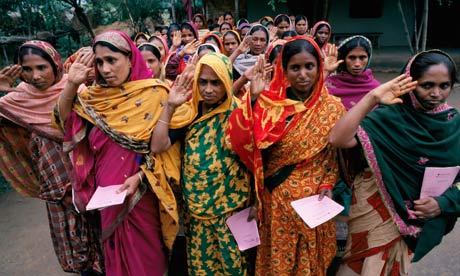..


Rural Women In India
Do you think that Indian rural women are meant only for sex? We have seen in the rural areas that husband go on work and women who are traditional housewives remains for work at home and when husband arrives they have to do sex with their husbands no matter they want or not.


Rural Women in Pakistan
Indeed, women are considered as the real backbone of any nation, any country and our Constitution provides for the equality of women; however, these provisions often are not applied in practice.
It is disconcerting to think of the vast majority of Pakistani women, in particular, rural women in Sindh and Balochistan provinces, who suffer in absolute misery and wretchedness becoming a backbone to anyone. In rural Pakistani society women are little valued and appreciated. Their backbones, spirit and will are shattered by official neglect and indifference and the daily reality of domestic violence, illiteracy, sexual exploitation, underage marriages, lack of education and grinding poverty.
The incumbent rulers are requested to show their practical commitment towards the elevation of rural women in Pakistani society, who have always given them their support freely and democratically, for democratic and equality based Pakistan.
The rulers must get the votes of women of remote parts of Sindh registered and launch women friendly projects so as to improve their socioeconomic conditions in today's Pakistan.


Rural Women in Bangladesh
Women in Bangladesh have been subjected to exploitation and negligence for decades. In a society, which is basically male dominated, women, have always been kept oppressed by religious fanaticism, superstition, oppression and various discrimination. Their merit and labor have only been recognized in domestic lore. Though lately, Bangladesh has realized that ‘empowerment of women’ is a necessary condition for economic development to keep pace with the world. In the international arena Bangladesh ratified the Convention on Elimination of all forms of Discrimination Against Women, (CEDAW) in 1984.

Does gender equality contribute to economic growth? If yes, it might galvanize our growth-obsessed policymakers to take a more serious interest in gender equality. And does economic growth contribute to gender equality? If so, perhaps many hitherto sceptically feminists may take more interest in growth. We would have a win-win situation. But what if the answer to one of these questions is no?

Rural Women In India
Do you think that Indian rural women are meant only for sex? We have seen in the rural areas that husband go on work and women who are traditional housewives remains for work at home and when husband arrives they have to do sex with their husbands no matter they want or not.
Rural Women in Pakistan
Indeed, women are considered as the real backbone of any nation, any country and our Constitution provides for the equality of women; however, these provisions often are not applied in practice.
It is disconcerting to think of the vast majority of Pakistani women, in particular, rural women in Sindh and Balochistan provinces, who suffer in absolute misery and wretchedness becoming a backbone to anyone. In rural Pakistani society women are little valued and appreciated. Their backbones, spirit and will are shattered by official neglect and indifference and the daily reality of domestic violence, illiteracy, sexual exploitation, underage marriages, lack of education and grinding poverty.
The incumbent rulers are requested to show their practical commitment towards the elevation of rural women in Pakistani society, who have always given them their support freely and democratically, for democratic and equality based Pakistan.
The rulers must get the votes of women of remote parts of Sindh registered and launch women friendly projects so as to improve their socioeconomic conditions in today's Pakistan.
Rural Women in Bangladesh
Women in Bangladesh have been subjected to exploitation and negligence for decades. In a society, which is basically male dominated, women, have always been kept oppressed by religious fanaticism, superstition, oppression and various discrimination. Their merit and labor have only been recognized in domestic lore. Though lately, Bangladesh has realized that ‘empowerment of women’ is a necessary condition for economic development to keep pace with the world. In the international arena Bangladesh ratified the Convention on Elimination of all forms of Discrimination Against Women, (CEDAW) in 1984.
Women's economic empowerment offers a win-win scenario
Not only does gender equality lead to higher economic growth, it is key to ensuring a fairer world for both men and women

Women in Bangladesh,
which performed better in the 2011 Gender Gap Report than much richer
countries. Photograph: Karen Kasmauski/Getty Images/Science Faction
Does gender equality contribute to economic growth? If yes, it might galvanize our growth-obsessed policymakers to take a more serious interest in gender equality. And does economic growth contribute to gender equality? If so, perhaps many hitherto sceptically feminists may take more interest in growth. We would have a win-win situation. But what if the answer to one of these questions is no?